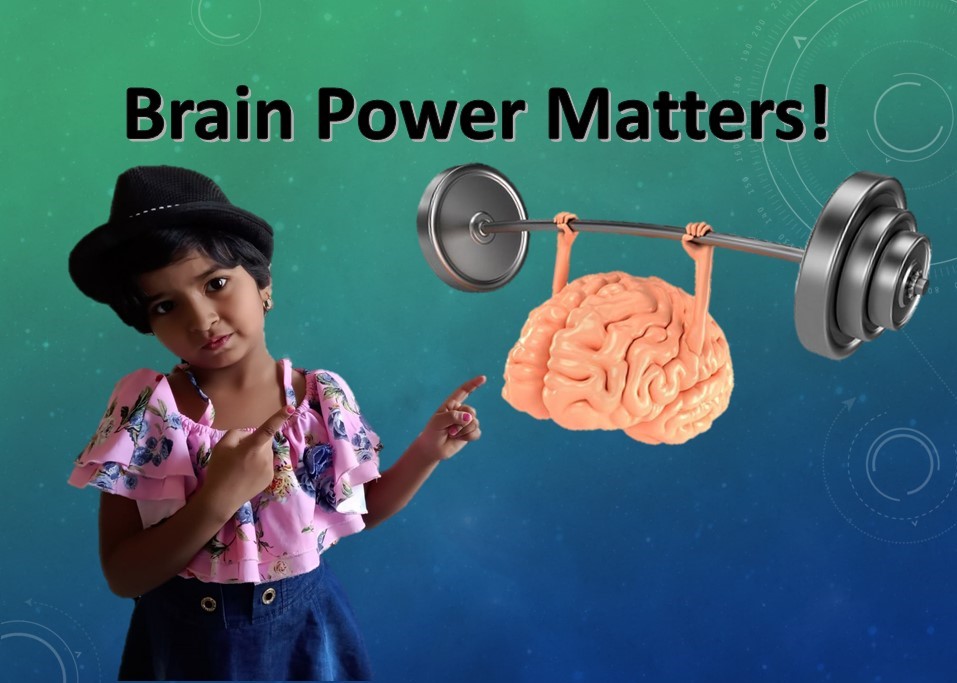
To read the Marathi version of this article, click here: ब्रेन पॉवर (मानसिक आरोग्य)
We all want to be happy, right? “Happiness is a state of mind,” as quoted by great people. Your happiness lies in your own hands, and no one else controls it. A healthy mind lives in a healthy body and vice versa. Our physical and psychological health are inseparable. They affect each other.

What exactly is mental health? It means our emotional, psychological, and social well-being.
Psychological health is related to thinking, expressing, and behaving appropriately according to our emotions.
Emotional health refers to our ability to express feelings.
Social health refers to good relationships.
Having good emotional health does not mean you are always happy or free from negative emotions. It is about having the skills and resources to manage the ups and downs of day-to-day life. Mental health is essential at every stage of life, from childhood to adolescence to adulthood.

Studies have shown that people with higher psychological well-being live longer and healthier lives. They also have a better quality of life and fewer social problems. We all deserve to be happy. And we have to raise a healthier generation. So, let us first learn about the developmental stages from birth to adolescence. Once we understood the development, it will be easy to implement some strategies to maintain and improve those skills.
In the first five years of life1, there occurs incredible growth in social and emotional development. A child’s brain doubles in size in the first year and reaches 80% of its adult brain size by the age of three.
Social-Emotional Developmental Milestones2:
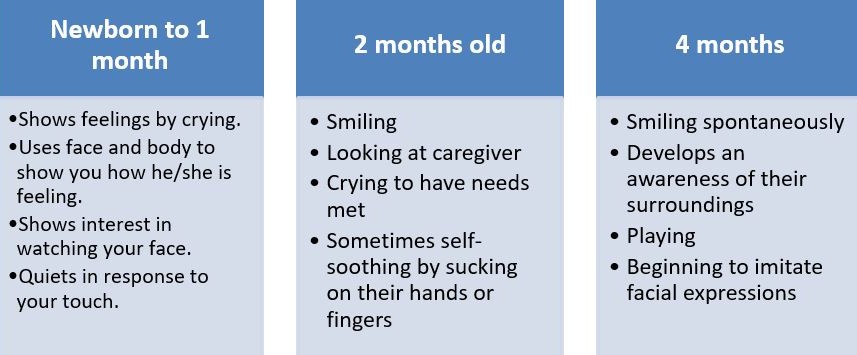

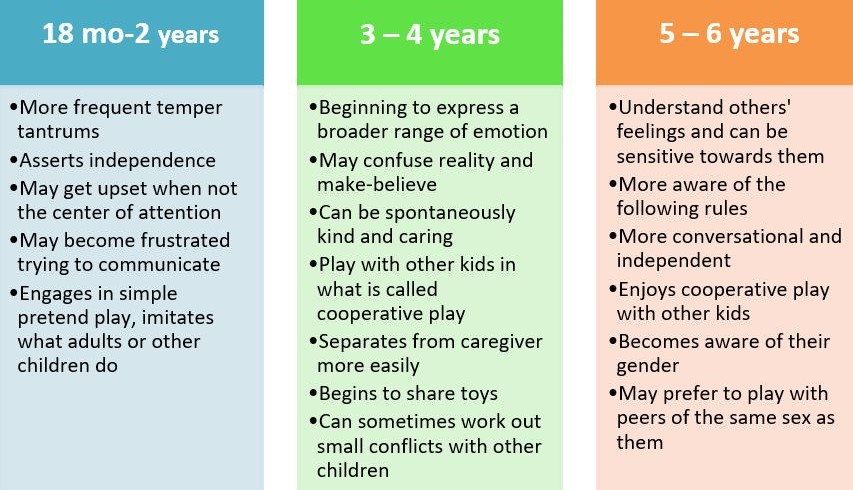
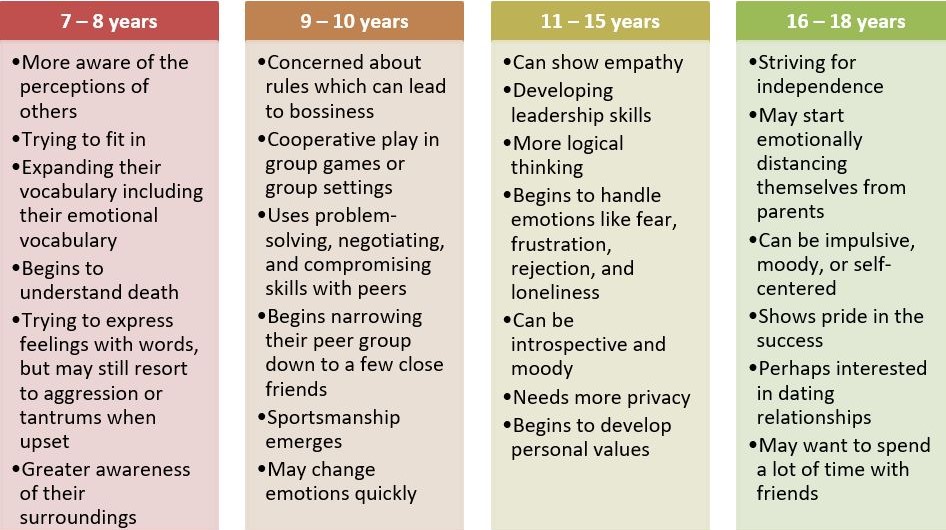
Ways to Work on Social-Emotional Development of child3
- Be a model of the emotions and behaviors you want your child to show. You are your child’s first teacher, and they look up to you as a role model.
- Be responsive to your child’s emotions and behaviors. Responding will help to develop trust between you and your child.
- Ask open-ended questions, such as “What would you do?” to help develop problem-solving skills.
- Use stories to talk to your child about different social situations and how each person might be feeling.
- Encourage kids to try new things and learn how much they can do.
- Play games to teach kids how to take turns, win and lose, share, and negotiate.
- Ask your child questions when they are upset. These questions can be about why they are upset or offering alternatives to understand the root of their unhappiness. For example, “Would you like to brush your teeth or take a bath first?”
- When using a screen (not recommended before 18 months), sit with your child, and make it a social activity, e.g., asking them questions or playing turn-taking games.
- Allowing your child to interact and play with other kids is one of the best ways to teach your child how to relate to others. They begin to develop social problem-solving skills.
How to improve mental health?
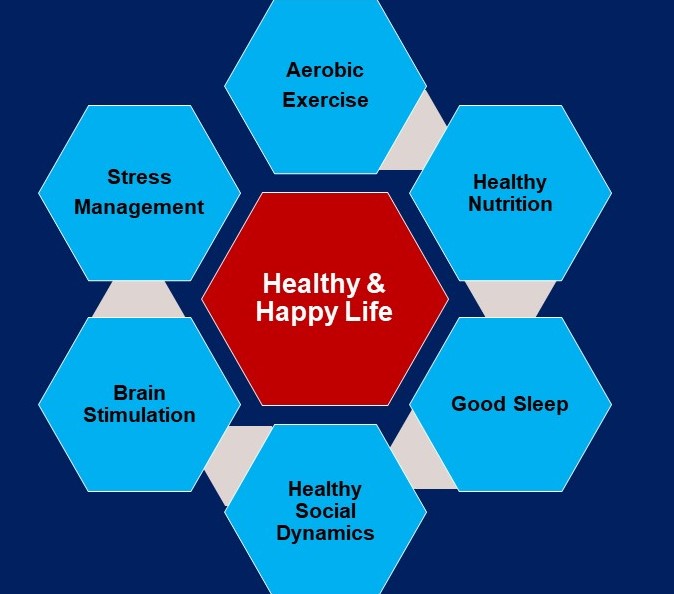
Prioritize physical exercise: Brain is a part of your body. When you exercise your body, it sharpens the brain. Exercise helps memory and thinking through both direct and indirect means. The benefits of exercise come directly from its ability to reduce insulin resistance, reduce inflammation, and stimulate the brain’s release of chemicals that affect the health of brain cells, the growth of new blood vessels in the brain, and even the abundance and survival of new brain cells. Indirectly, exercise improves mood and sleep and reduces stress and anxiety. Click here to read more: Dare to be Fit.
Balanced diet: a mindful diet including the right balance of complex carbohydrates, good proteins, healthy fatty acids including omega 3 fatty acids, vitamins, and minerals is necessary for good health. Click here to read more: A mindful diet.
Improve sleep hygiene: There is no secret about how sleep plays an important role in good physical and mental health. Sleep is essential for the number of brain functions. During sleep, our body rests, but the brain is busy processing the information which we learn/hear during the day and then creates memories. Poor sleep makes it more difficult to cope with stress. Removal of toxins from our brain which build up during the day also happens during sleep. Click here to read more: SHHH…My Brain Is Sleeping
Drink plenty of water: Not drinking enough water can cause dehydration. Dehydration can lead to headaches, tiredness, and it reduces alertness, cognitive skills. Water is not the source of life, it is life! Click here to read more: Are You Drinking Enough Water?
Do not smoke, do not drink to excess or use other recreational drugs.
Yoga, pranayama, and meditation: Yoga is a group of physical, mental, and spiritual practices that originated in ancient India. It is practiced in Hinduism, Buddhism, and Jainism. Indian yoga gurus introduced yoga to the western world. Yoga as exercise is a physical activity consisting mainly of asanas (yoga poses), accompanied by the breathing exercises of pranayama, and ending with a period of relaxation or meditation. It helps in controlling the body and mind. It also helps to release any suffering and find inner peace. Yoga brings harmony in life and is known for disease prevention, health promotion and management of many lifestyle-related disorders. Millions and millions of people across the globe have benefited by the practice of Yoga.
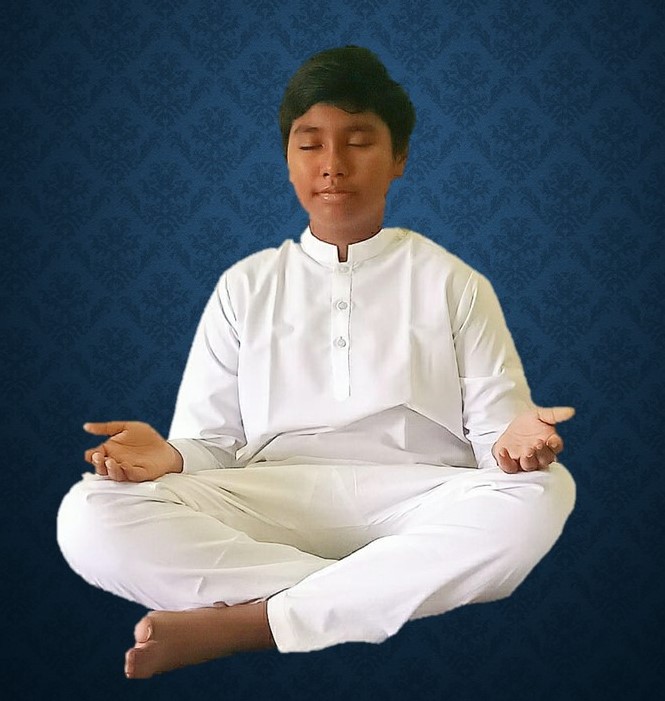
Since 2015, the International Day of Yoga has been celebrated annually on 21 June. There are many resources to learn and practice yoga, paid as well as free. You can join in-person classes or online classes or use some apps. You can find lots of videos on YouTube.
As more and more people are realizing the importance of yoga, new online resources are coming up. ‘Art of living‘ and ‘Inner engineering‘ are very popular online as well as in-person paid resources available for yoga and meditation. You have to decide which resources are worth of your time as well as your unique needs.
Here are some free online yoga resources for you:
- DoYogaWithMe.com: It is a free online yoga resource with high quality videos. It allows you to choose the video for your daily practice. It also has prenatal yoga, yoga for digestion and chair yoga videos.
- Yoga with Adriene: One of the most popular YouTube channel. The videos are beginner friendly.
- Kino Yoga: There are many short and to the point videos, mostly focusing on Ashtanga Yoga (physical and athletic style of yoga, created by K. Pattabhi from Mysore, India).
- Heart Alchemy Yoga: Free YouTube videos for all levels of Yoga.
- TheYogaRoom: is the private Facebook group. You can follow yogis across the globe and obtain advice, tips, poses and yoga news.
Free yoga apps:
- Downdog App
- Daily Yoga App
- Simply Yoga app
Brain activities to stimulate your brain:
You might have heard the word, neuroplasticity. No, brain is not made of plastic.😀 What brain plasticity/neuroplasticity means brain’s ability to change throughout the life. The human brain has amazing ability to form new connections between brain cells and reorganize. Research shows that brain does not stop changing through learning. Brain plasticity is based on the principle of “use it or lose it”-if you do not continue to practice or use the ability, you might lose that ability.
If you play memory games at least 30 minutes daily, it will sharpen your brain and improve your concentration and memory. Some of the brain games are suitable for all ages while some are suitable for certain age groups.
Solving a daily crossword puzzle or word search puzzle or jigsaw puzzle is a great way to exercise your brain and keep your memory sharp. Our left brain is logical while right brain is creative. When you do puzzles, both sides of brain are engaged. Puzzles can also help in a variety of memory-related neurological diseases, including dementia, Alzheimer’s, and more. There are many ways you can do a crossword, both online and offline (newspaper, books). There are some apps and free websites.
Sudoku is a number placement game that relies on short-term memory. You can play Sudoku online, on an app, or on paper.
Other activities: Building blocks, board games (monopoly, scrabble, checkers, chutes & ladders, and many more), card games, maze, memory games, coloring books, drawing, making crafts, chess, character matching games, dominoes, Simon says, rock-paper-scissors and the list goes on.
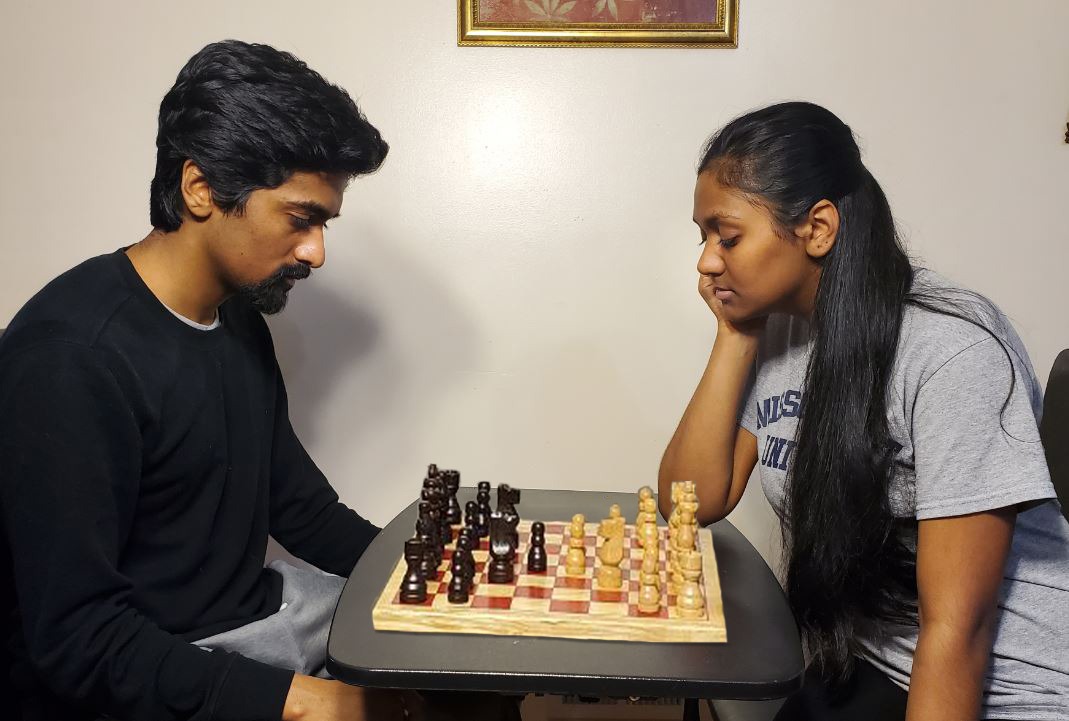
Pretend play, role play, or make-believe play is a great brain development activity for young children as it plays a critical role in a child’s cognitive and social development. It helps to develop a child’s language skills, social and emotional skills, nurtures their imagination, and improves understanding of the world around them.
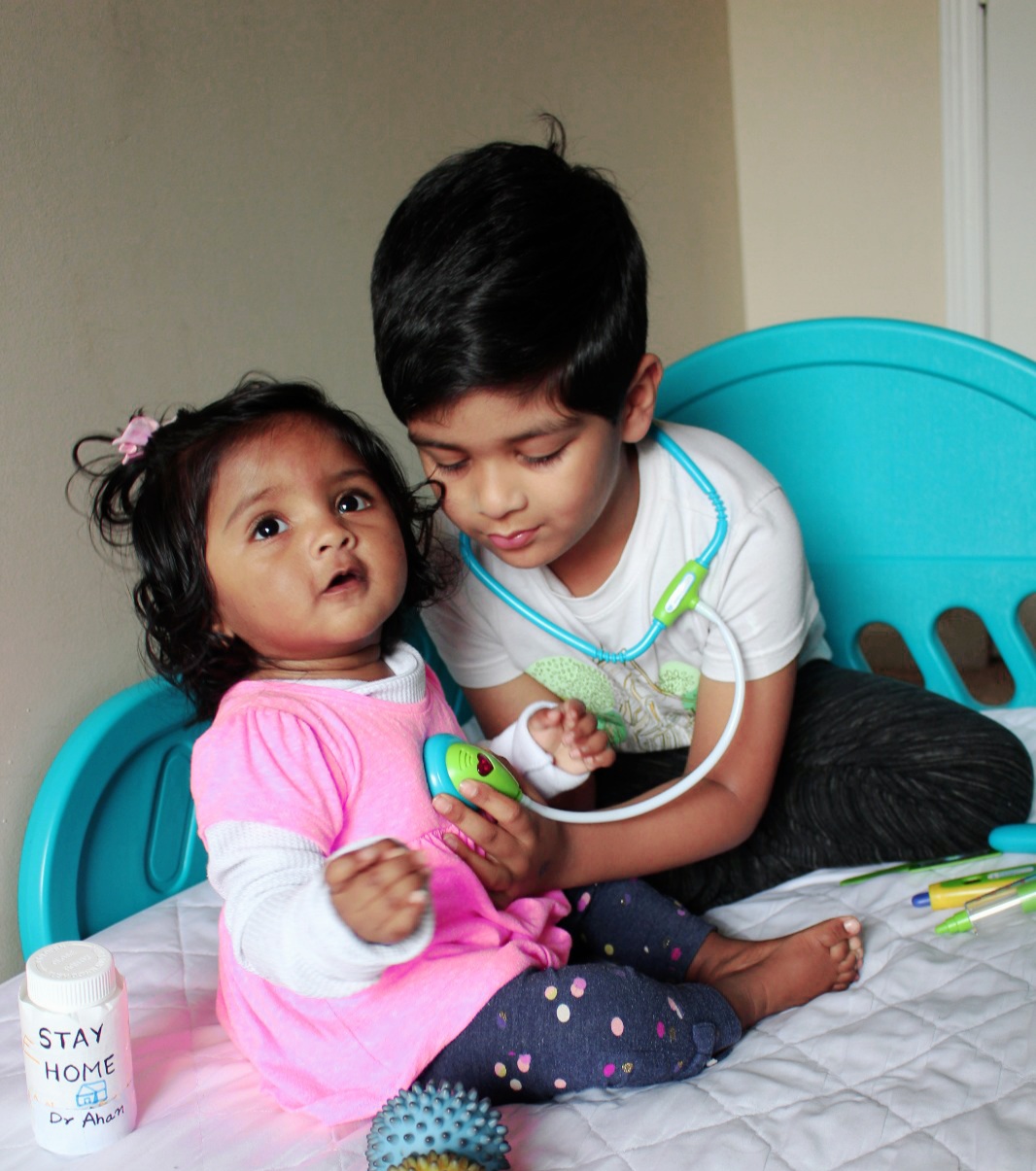
Storytelling helps a child to improve his focus and attention. It helps with memory and stimulates thought processes. Players sit in a circle and one person begins a story using any sentence they wish. The players take turns repeating the sentences and adding a new one. If someone misses a word, they are out. The kid able to tell the story without a mistake is the winner!
Some very good apps for brain games:
1. TotalBrain: Gives you an assessment for different aspects of your mental health. Then allows you to play fun games to train high or low performing capacities. Very unique in its approach to improving aspects of mental health and cognition.
Web link (you have to request access)
2. Unblock Me : The goal is to unblock the red block out of the board by sliding the other blocks out of the way, unblock it with the minimal moves.
Links: PC; Android app ; Apple app
3. Untangle: Move the points around so that none of the lines cross.
Links: Web; Android app; Apple app
4. Chess: You and I both know what this is. Stimulates your brain with endless possibilities. Anticipate the enemy, plan your attack, defend your king, and defeat theirs.
Links: Web; Android app; Apple app
5. Puzzles/Riddle videos: interesting riddles and puzzle videos. The author will explain the puzzle, you pause the video and try to solve it on your own, and then resume the video to find out the answer. They can be very difficult but highly rewarding when you figure it out. Videos:
6. Random Spatial Reasoning games: The T-puzzle; Fibonicci
Play musical instruments or sing or dance.

Develop a hobby and learn a new skill like painting, knitting, photography, gardening, photo-shopping. Start writing something. In this technological era, there is so much new to learn. Many brain training apps make learning easier and more productive.
Laughter is the best medicine! Listening to jokes activates the areas of the brain involved in learning and creativity. Laughter helps people to think more broadly. Take yourself less seriously and share your embarrassing moments.
Reading is the best brain exercise. Read inspirational stuff. Train your brain to think positive! Too much stress kills brain cells (neurons) and prevent creating the new ones. Practice positive thoughts until they become your default mindset. Replace negative thoughts with positive and more realistic thoughts. Try to look at the problems and situations positively.
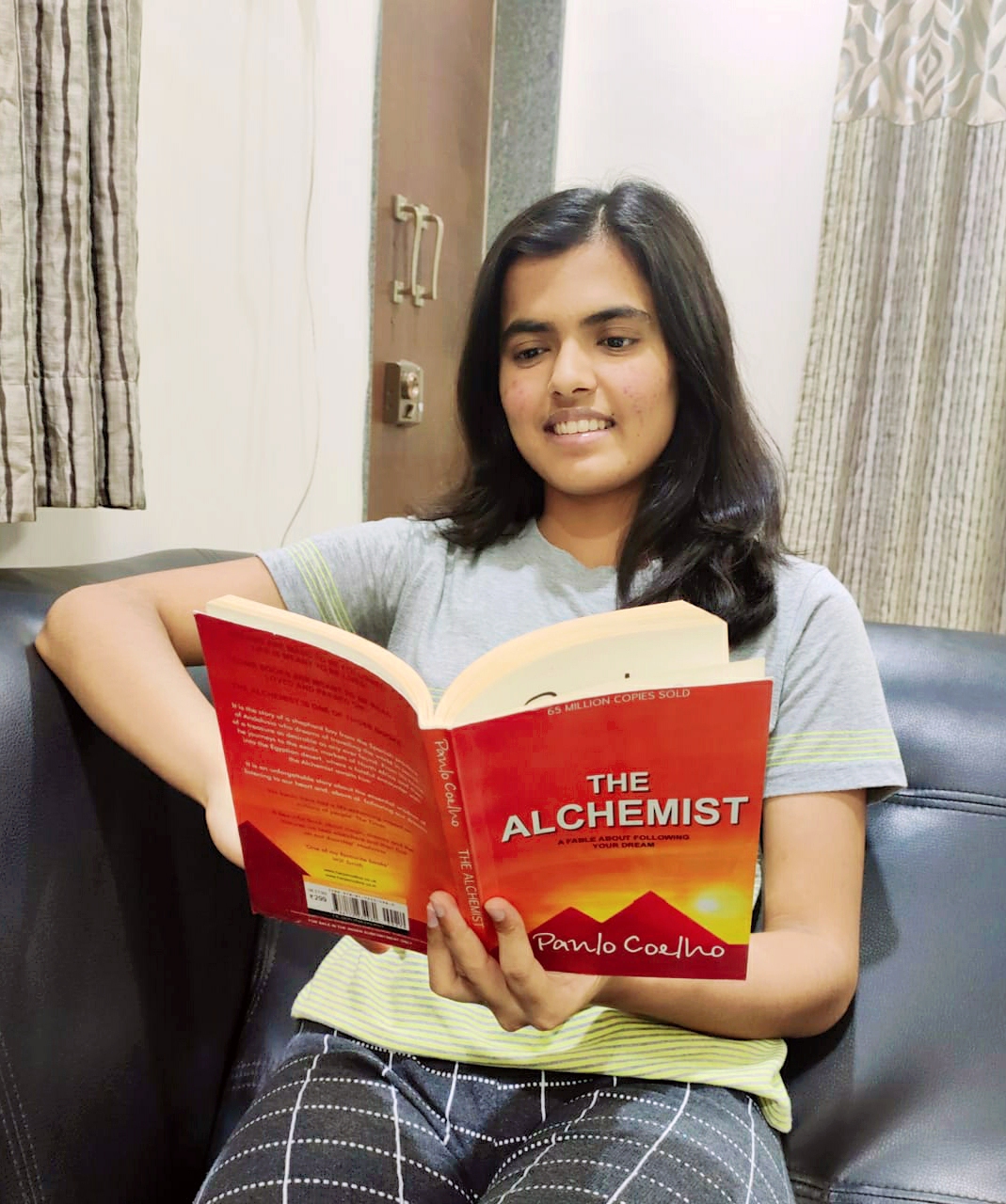
Develop and maintain social circle. Spend time with playful and positive people. Loneliness affects very negatively on your emotional and physical health. The quality of relationships matters more than the quantity. Deep connections are important.
Pets are useful to combat stress.
Limit the screen time (TV, smart phones, computer etc): Screen can be addictive. It is opposite to physical exercise. It might make you overweight, isolated. It can negatively impact on your relationships. We put aside important things like exercising, spending time with family, eating right, finishing work, making phone calls or cleaning the house to watch TV. Try to take a break (screen/digital detox) from screen for one week and see what happens to your life! For more information: Screen time: How Much is Too Much?
Learn to live with gratitude: Gratitude can be a family project. Teach your children to practice gratitude. Encourage them to say “thank you” on a regular basis. You should recognize the things to be grateful for and try to express gratitude. No matter what type of family background is, you can build a family gratitude project in many different ways. It can be a small family meeting where everyone talks about good things in their life. You can keep a jar and all family members can put a slip of paper by writing down something they are grateful for. Or everyone takes turns during dinner sharing one thing they are grateful for. Recall positive life events. Spend some time thinking about your best memories of life.
Perform acts of kindness: Doing something for other people can make you happier and it will improve your psychological well-being. It can be simple thing like helping a neighbor, pick up litter on the beach, give a stranger a compliment, bake cookies for elderly, be a good listener, smile, or hold the door open for the next person.
Identify your strengths and weaknesses: Remind yourself of your strengths and feel capable and confident. At the same time, identify your weaknesses and try to work on it. Working on improving yourself makes very good impact on your mental health.
Practice forgiveness: We all make mistakes! Forgiving another person is equally important to forgiving yourself. Forgiving someone does not mean that you allow that person to hurt you again. It can be a painful challenge but very valuable. It brings you mental peace, happiness, hopefulness and optimism.
Accept people as they are: Acceptance is a gift that gives back. We all have trouble accepting people who are different. Did you ever meet anyone who is exactly like you? No, right? Every person has his right to be unique. It means, they have their own feelings, thoughts and opinions. Let them be different. You can not change them into the people you want them to be. Once you understand this, you will start accepting them for who they are. Do not judge people and do not compare yourself with anybody. Accept yourself too. You are not going to be happy because there is always going to be someone who is better, smarter or richer. Instead, we must accept that each person is on a different path in life.
Live in the present moment: Our life is fast paced with hectic schedules, which makes us to feel anxious, unhappy and stressed out. It gets more complicated if we caught up in thinking about the past or the future. Hence, we have to practice to live in the present! Present moment is the point between past and future. There should be balance between past, present and future4.
- Think about the past in small doses, and make sure you are focusing on the past for a reason (e.g., to relive a pleasant experience, identify where you went wrong, or figure out the key to a past success).
- Think about the future in small doses, and make sure you are focusing on the future in a healthy, low-anxiety way (e.g., don’t spend time worrying about the future, think about the future just long enough to prepare for it and then move on).
- Stay in the present moment for the vast majority of your time.
Mentally healthy people have5
- A sense of satisfaction
- A zest for living and the ability to laugh and have fun.
- The ability to deal with stress and bounce back from adversity.
- A sense of meaning and purpose, in both their activities and their relationships.
- The flexibility to learn new skills and adapt to change.
- A balance between work and play, rest and activity, etc.
- The ability to build and maintain fulfilling relationships.
- Self-confidence and high self-esteem.
In short, being mentally healthy is fundamental to living your best life! Develop a daily habit of building mental strength and give up bad habits that hold you back.
Referrences:
- http://helpmegrowmn.org/HMG/DevelopMilestone/SocialEmotionalMilestones/index.html
- https://www.thechaosandtheclutter.com/archives/social-emotional-developmental-milestones
- https://pathways.org/topics-of-development/social-emotional/
- https://positivepsychology.com/present-moment/
- https://www.helpguide.org/articles/mental-health/building-better-mental-health.htm

Very resourceful article! It is indeed important in times like these!
Thank you, Chhaya 🙂
Well written article, covering all aspects, suprisingly in minimum words, considering all contents. Very good read.
Thank you, Shrikant 🙂
Good
Thank you, Girish 🙂
Excellent article
Of course it’s perfectly written..l think Om Shanti teachings in it have glorified it beautifully.
Thank you. I was a follower of brahmakumari. I visited Mt. Abu too.
Very informative got lots of different ideas for my kids.Thanks:)
Thank you, Pratiksha 🙂
🙏🙏 Wonderful Aunty🙏🙏 .I was waiting 2-3 days to write a proper comment rather than short response this time😍.As a doctor you are not only treating people but educating people to adapt good habits which in itself is very big effort towards humanity 😎. You are inspiration for the people who have made the word ‘Arey time kahan hai mere pass’ a prominent word in their day to day life 🥰. Each time I go through your write up I understand the time n efforts spent…. as all articles(specially this n Covid )are written in such a way that ppl of any age can understand each bit of it.
I would request everyone to read article completely and write a comment rather than simple like 😍
That is very nice of you, Mamta to take time and write a detailed feedback. I love to hear from people who read my articles. Now-a-days, there is so much misinformation circulating on social media misguiding people. That gave me idea to write scientific information about basic stuff like sleep, screen time, sleep and other aspects of health. It will be very rewarding for me if my articles make even a small impact on people’s life!
Loved to see that you covered many things about me in a single comment 🙂 Thank you and love you, dear!
It was my pleasure Aunty. Would be looking forward to read more n more articles on healthy lifestyles🙏
Nice article maushi… i think these day people are more involved with technologcal things and are less concerned about their health&diet. Atleast 50% of tips people should admire in their life… it will great affect on their health and mentally be a strong..specially youngster’s. Great work..I really appreciate with ur article😊.. thank you🙏
Thank you, Shriram 🙂
Thank you very much madam for your valuable information on maintaining good health as well as sharp brain power. It gives us guidance to lead a balanced life.
Thank you 🙂
Khup chan mahiti ahe वेळ काढून लिहिलय
Thank you!
Very nice elaborative article, it is need of present era
Yes, dear. Thank you.